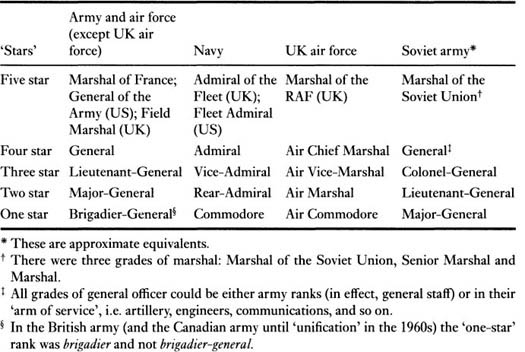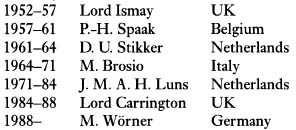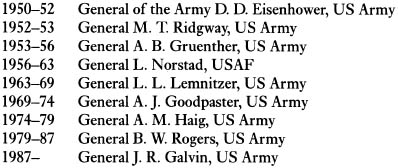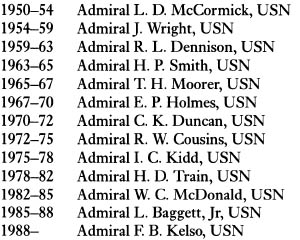The Cold War: A MILITARY History (69 page)

Accession of Spain
The protocol was signed in Brussels on 10 December 1981, but did not amend the treaty in any way.
APPENDIX
3
The Warsaw Treaty of Friendship, Co-operation and Mutual Assistance
Warsaw, Poland, 14 May 1955
Between the People’s Republic of Albania, the People’s Republic of Bulgaria, the Hungarian People’s Republic, the German Democratic Republic, the Polish People’s Republic, the Romanian People’s Republic, the Union of Soviet Socialist Republics, and the Czechoslovak Republic.
[Preamble]
fn1
Article 1
The contracting Parties undertake, in accordance with the Charter of the United Nations Organization, to refrain in their international relations from the threat or use of force, and to settle their international disputes by peaceful means so as not to endanger peace and security.
Article 2
The contracting Parties declare their readiness to take part, in the spirit of sincere co-operation, in all international undertakings intended to safeguard international peace and security and they shall use all their energies for the realization of these aims.
Moreover, the contracting Parties shall work for the adoption, in agreement with other States desiring to co-operate in this matter, of effective measures towards a general reduction of armaments and prohibition of atomic, hydrogen or other weapons of mass destruction.
Article 3
The contracting Parties shall take council among themselves on all important international questions relating to their common interests, guided by the interest of strengthening international peace and security.
They shall take council among themselves immediately, whenever, in the opinion of any of them, there has arisen the threat of an armed attack on one or several States that are signatories of the Treaty, in the interests of organizing their joint defence and of upholding peace and security.
Article 4
In the event of an armed attack in Europe on one or several States that are signatories of the Treaty by any State or group of States, each State that is a Party to this Treaty shall in the exercise of the right to individual or collective self-defence in accordance with Article 51 of the Charter of the United Nations Organization, render the State or States so attacked immediate assistance, individually and in agreement with other States that are partners to this Treaty, by all the means it may consider necessary, including the use of armed force. The States that are Parties to this Treaty shall immediately take council among themselves concerning the necessary joint measures to be adopted for the purpose of restoring and upholding international peace and security.
In accordance with the principles of the Charter of the United Nations Organization, the Security Council shall be advised of the measures taken on the basis of the present article. These measures shall be adopted as soon as the Security Council has taken the necessary measures for restoring and upholding international peace and security.
Article 5
The contracting Parties have agreed on the establishment of a joint command for their armed forces, which shall be placed, by agreement among these Parties, under this command, which shall function on the basis of jointly defined principles. They shall also take other concerted measures necessary for strengthening their defence capacity, in order to safeguard the peaceful labour of their peoples, to guarantee the inviolability of their frontiers and territories and to provide safeguards against possible aggression.
Article 6
For the purpose of holding the consultations provided for in the present Treaty among the States that are Parties to the Treaty, and for the purpose of considering problems arising in connection with the implementation of this Treaty, a political consultative committee shall be formed in which each State that is a Party to this Treaty shall be represented by a member of the government, or any other specially appointed representative.
The committee may form the auxiliary organs for which the need may arise.
Article 7
The contracting Parties undertake not to participate in any coalition and alliances, and not to conclude any agreements the purposes of which would be at variance with those of the present Treaty.
The contracting Parties declare that their obligations under existing international treaties are not at variance with the provision of this Treaty.
Article 8
The contracting Parties declare that they will act in the spirit of friendship and co-operation with the object of furthering the development of and strengthening the economic and cultural relations between them, adhering to the principles of mutual respect for their independence and sovereignty, and of non-interference in their internal affairs.
Article 9
The present Treaty is open to the accession of other States – irrespective of their social and State systems – which may express their readiness to assist in the present Treaty, in combining the efforts of peace-loving States for safeguarding the peace and security of the peoples. This act of acceding to the Treaty shall become effective with the consent of the States which are a Party to the Treaty, after the instrument of accession has been deposited with the Government of the Polish People’s Republic.
Article 10
The present Treaty is subject to ratification, and the instruments of ratification shall be deposited with the Government of the Polish People’s republic.
The Treaty shall take effect on the date on which the last ratification instrument is deposited. The Government of the Polish People’s Republic shall advise the other States that are Party to the Treaty of each ratification instrument deposited with it.
Article 11
The present Treaty shall remain in force for twenty years. For the contracting Parties which will not have submitted to the Government of the Polish People’s Republic a statement denouncing the Treaty a year before the expiration of its term, it shall remain in force throughout the following ten years.
In the event of a system of collective security in Europe, and the conclusion of a general European Treaty of collective security to that end, which the contracting Parties shall unceasingly seek to bring about, the present Treaty shall cease to be effective on the date the general European Treaty comes into force.
SUBSEQUENT CHANGES
There were no new accessions to the treaty.
There were no known amendments to the treaty.
Albania severed all relations with the USSR in December 1961, which implicitly included leaving the Warsaw Pact. It is doubtful that it complied with Article 11.
The Warsaw Treaty was not formally discontinued; it ceased to exist.
fn1
The Preamble has been omitted; it sets out the overlying principles and identifies the national representatives at the meeting.
APPENDIX
4
Equivalent Ranks and the ‘Star’ System
The military method used within NATO was to refer to senior appointments by their ‘star’ equivalent (which was also used to denote passengers’ rank on staff-car plates). This saved repeated cross-references to naval, land and air equivalents. The corresponding national ranks were as follows:

APPENDIX
5
Senior Appointments 1949–89: NATO and the Warsaw Pact
NATO
Secretary-General

Chairman of the NATO Military Committee in Permanent Session
fn1

Chairman of the NATO Military Committee
fn2


Major NATO Commanders (MNCs)
SUPREME ALLIED COMMANDER EUROPE (SACEUR)

SUPREME ALLIED COMMANDER ATLANTIC (SACLANT)
